#But it is owned and operated by the developers
Explore tagged Tumblr posts
Text
For some people, that humanity gets trained out of them. For others, the threat of punishment suppresses it. To keep bosses happy, Tenumah explained, agents develop tricks. If your average handle time is creeping up, hanging up on someone can bring it back down. If you’ve escalated too many times that day, you might “accidentally” transfer a caller back into the queue. Choices higher up the chain also add helpful friction, Tenumah said: Not hiring enough agents leads to longer wait times, which in turn weeds out a percentage of callers. Choosing cheaper telecom carriers leads to poor connection with offshore contact centers; many of the calls disconnect on their own. “No one says, ‘Let’s do bad service,’” Tenumah told me. “Instead they talk about things like credit percentages”—the number of refunds, rebates, or payouts extended to customers. “My boss would say, ‘We spent a million dollars in credits last month. That needs to come down to 750.’ That number becomes an edict, makes its way down to the agents answering the phones. You just start thinking about what levers you have.” “Does anyone tell them to pull those levers?” I asked.
“The brilliance of the system is that they don’t have to say it out loud,” Tenumah said. “It’s built into the incentive structure.” That structure, he said, can be traced to a shift in how companies operate. There was a time when the happiness of existing customers was a sacred metric. CEOs saw the long arc of loyalty as essential to a company’s success. That arc has snapped. Everyone still claims to value customer service, but as the average CEO tenure has shortened, executives have become more focused on delivering quick returns to shareholders and investors. This means prioritizing growth over the satisfaction of customers already on board.
778 notes
·
View notes
Text
I sometimes feel like many marketing people need a reintroduction to the concept of a "cash cow". A cash cow is an income stream that provides steady returns with minimal maintenance. It's never going to be giant and take off and make you rich, but also, you aren't going to lose it unless you fuck up bigtime or there's an apocalypse.
A business where it is providing a steady living and you have the capacity to maintain the business without stress isn't exactly a cash cow -- it's "too much" work for that -- but it's a friend of a cash cow.
The goal of a lot of small-scale farming operations is to develop exactly what OP's family has. A big part of my job involves the services provided to farmers by nonprofits to assist them with achieving this exact goal, in various ways, including that sometimes I myself do direct service provision. My most recent client was a small dairy farm, and their goal was to move from selling just milk to small-scale yogurt production, because the income from yogurt would likely allow one of the owners to quit their off-farm job. They don't want to get rich or get big or have to compromise. They want to work with their small number of heritage-breed cows and make tasty things for their neighbors and sell at a locally-owned nearby market, and make enough money to live on comfortably.
That's success, even if people with business-poisoned brains can't see it.
My dad raises grass-fed beef cattle and I help him sell it, mainly by maintaining an online presence. For a while, I kept having the most ridiculous conversations with people who I assume were marketing students. I didn't want to be rude so I'd try to let them down gently but this one guy just kept insisting that with his magical marketing skills he could grow our business.
What he could not seem to comprehend is that we could not grow our business, at least not without significant time and monetary investment. Cows take two years from pregnancy to the size that you can sell. If we buy adult cows, our margins become razor thin or even negative. Even if we somehow could acquire some cows, our barn and hay fields are already near maximum capacity. Renting another field would be relatively easy, building a bigger barn not so much.
Cows are living animals, they aren't widgets that can be produced infinitely. Besides that, many businesses inherently cannot grow, because if they do they'll become something else. The delicious bakery down the street cannot produce much more than they do, if they began mass marketing and production they'd eventually be selling the equivalent of Twinkies. We grow grass-fed, organic beef, if we expanded how long would that last? Eventually we'd become the very factor farms that we hate. Some things can only ever be made on a small scale and they are usually the best things.
But also, what are they teaching them at marketing school and how is it so disconnected from reality?
32K notes
·
View notes
Text
There is some kind of tagging discourse here on tumblr with crossovers I've seen recently and I think these discussions are kinda missing the point what the real problem is.
I think it's the bad tumblr search engine in which you can't even exclude tags/words with it. They added some search operators just LAST YEAR ( I'm kinda baffled that a site this old, took so long to add these):
https://help.tumblr.com/knowledge-base/search-and-filtering-basics/
, but as you can see there is no operator to filter out tags from the search result. If anything we should ask tumblr that they should add a better search engine.
In the meantime we have the block list, but even then you can still see the post, censored but still there. Kinda annoying when there is pages after pages with only censored boxes. Why are these post not hidden like when you block a user? I don't know but again a tumblr problem.
I did some reasearch and found small solution for this problem, at least for desktop user. Have you heard of the extension " Tumblr Savior"?
I did some test and it actually can hide post with the word you put in the blacklist of the extension. Here is a comparison with the most popular crossover in the phandom as an example in firefox:
extension deactivated; 3 crossover posts just on this screenshot:

extension activated; after refreshing the page the order is different but no crossover in sight, not even censored :

I used this blacklist:

with these settings; I only ticked "Hide filtered content"
( Also there are a lot options ticked by default which hides so much stuff, so check the settings):

I also pinned it on the toolbar for quick access

and when I'm in the mod for some blacklisted crossovers I simply put the crossover name in the whitelist without much hassle to see them again:

Well, this is an extension outside of tumblr and also in general with extensions, use them on your own risk, but at least there is something to make this annoyance less annoying.
(Also, I think this is common sense, but if something seems strange like glitchy UI or disappearing usernames etc. deactivate the extension first before contacting the tumblr support and wait for an extension update.)
65 notes
·
View notes
Text
I make jokes on occassion about the place I live being Gotham but with more trees (anywhere, USA) but like....yall...I cannot stress enough...How much This Municipal Election fucking matters and how god damned...ya know what here...
Raleigh, NC is one of the fastest growing cities in America. I HATE that about it. For YEARS we have had a Mayor named Mary Ann Baldwin, who took any bribe a real-estate developer would give her. She even, along with city council, lengthened her term WITHOUT TELLING THE PUBLIC!! Using some loophole in the city constitution or whatever. My hometown and birthplace has become gentrification displacement fucking central!
But THIS ELECTION is THE FIRST ONE that Baldwin is stepping down and NOT RUNNING AGAIN!! Do you want to know who the feont runners are for her position?
A woman whose entire job over the past few years has been converting the land that the Dorthea Dix Mental Hospital was on into a city destination park.
And a guy whose website looks like THIS...

His name is Terrance Ruth so his campaing slogan, I SHIT YOU NOT is "TRUTH FOR RALEIGH"
We don't HAVE a city seawall, thank fuck; But--ya know--at this point I wouldnt even be surprised if one magically blew up and flooded us.
#Fuck sake#Yep#My city isnt run by the mafia#But it is owned and operated by the developers#The PRIVATE developers#Who are often feom NYC and rich as hell#RTP might as well be Wayne Enterprises#Aaaannnd hmm....as far as I know we dont have any orphanages but who fucking knows right??#None of the Old Money ITB kids would fucking DARE be vigilantes about anything tho#None of them give a shit#God dammit#I cant make this up#Lowkey tho if a masked serial murderer wanted to off Baldwin Id be on their side SO FAST
2 notes
·
View notes
Text
no but seriously what was the fucking deal with Ruidusborn. like the TCSR and Call of the Netherdeep both made it seem like cut and dry discrimination; not so much racism as perhaps disability given the similarities to practices of leaving weak infants to die (for a coherent sf...not even metaphor, straight up text, might I recommend the Hugo and Nebula winning The Mountains of Mourning), but like, very clearly the victims here. And then it turned out that a subset of them did, in fact, have destructive and invasive powers and could serve as the vessel to, effectively, a targeted biological weapon; that several of them had violently turned on the people who were attempting to help them and normalize their acceptance, for no other reason than "a powerful man said so and they didn't have a complete cure fast enough"; and that they were actively recruiting child soldiers and allying with multiple authoritarian states. I am currently running Netherdeep and I'm deep in the Netherdeep portion (not quite to the Heart of Despair), and it's actually wild playing Alyxian knowing that this metaphor is not just broken but like, twisted in some kind of junkyard compressor/electromagnet hellscape way that's impossible to untangle and one can only say "uh what the fuck"
#cr tag#i genuinely would LOVE to hear the order of operations of planning bc like#cotn was obviously developed pre C3 character development#and on paper imogen and alyxian have interesting similarities that would seem meaningful and good#and then in practice it's like. uhhhhhhh could i get some. consistency in the story's own canon.
113 notes
·
View notes
Text
Me: I wonder what Hook calls Sampo in the Japanese dub? Probably oji-san, since it's shushu in the original Chinese?
Hook: Sampo-ojichan!!

Oji is "uncle," which is hilarious because Hook calls Natasha by "older sister" when she wants something. So Hook either just really wants to get on Natasha's good side, or she takes Sampo at face value when he refers to himself as an old man. She trusts him a lot and takes him at his word and she calls him as such!
And Sampo calls Hook either ojou-san or oujo-san (I can't find the Japanese sub to see the spelling, and I can't tell them apart by ear)!
One spelling, oujo, means "princess," it's how you would refer to royalty. The other, ojou, (which I assume is what he's actually saying) is something you call the young lady of a high-class family with a high social standing. In Genshin Impact, the intro scene for a popular ship, chilumi, shows Childe calling Lumine ojou-chan, which the English dub translated as "girlie." Since Sampo uses -san instead of -chan, his is more formal and respectful, it's more like "young lady."
...It's also how you would refer to the daughter of a yakuza leader, which I love, since Hook leads her own little gang (the Moles) skzhkskdkd
But it really gets me in the heart, because! Hook is generally looked at as a delinquent by most adults. Which I mean. Not without good reason, she
calls Natasha an old witch
frequently sneaks out into the Fragmentum
has left graffiti all over the side of the orphanage
was constantly picking fights with other kids
beat a man unconscious for stealing from her dad
and has already picked up on how business gets done in the Underworld, and uses/actively participates in it to get what she wants- she basically acts an information broker
like Hook earns her reputation haha. The Underground is lucky that what Hook wants is just like. Candy and toys and to play hide-and-seek. I'm sure she'll have the capability to raise all kinds of hell and be more like an actual gang leader when she's older, even if she chooses not to act on it.
So Sampo calling her so politely and respectfully is really sweet and cute! Yes, he's polite and respectful with everyone, but that's just it- he treats Hook much like he does everyone else. He doesn't tell her to buzz off because she's a kid. He doesn't lie or try to cheat her or assume she's naive because of her age. He never talks down to her. He really does just treat her like a respected business partner and he takes her seriously, which Hook really seems to appreciate. And even when Sampo does treat her like a kid, it's not in a negative way; he guides her on little adventures and chats with her and takes her for joy rides on his moped. All of which Hook also really appreciates, since everyone else is too busy trying to get by to make time to play with her. She absolutely adores him.
I hope they officially join forces someday and terrorize all of Belobog with their shenanigans JSKJZNDKSJ
So Hook calls Sampo "Uncle Sampo" in a particularly affectionate/endeared tone, and Sampo calls Hook "Young Miss Hook" in a very respectful tone! And to reiterate:

#honkai star rail#hsr sampo#hsr hook#WHAT BUSINESS DO THEY HAVE BEING SO ADORABLE AUGH OTL#they're so cute...my heart...#I've seen people say Sampo is a bad influence on Hook but I don't really like that because I feel it takes away from Hook's character.#Let her be awful all on her own!!#god forbid women do anything skhzksjsnz#I actually do really like her just being like this no matter what though because I think Hook is a fascinating example of just how harsh-#-the Underground is and how it's developed separately from the Overworld and how it operates and what it takes to survive down there.#like Hook is like this because she grew up down there during the worst times.#even if she was born before the halves were sealed off she's too young to remember any of that.#I'm pretty sure the end of the main quest in Belobog was the first time she'd ever seen the sun.#and so I think it's really neat seeing how she operates and what she thinks of things. she offers an insight not many other characters do.#she's too nice for it but I would love for her to be more like a gang leader as she gets older it would be a fun divergence jzkzjdndkd#Sampo can be one of her business partners. Belobog is shaking in fear skxhjsjddn#hsr#honkai star rail sampo#honkai star rail hook#pitch dark hook the great#sampo koski#hook & sampo
182 notes
·
View notes
Text
Alastor would love to have a computer because while he still thinky vinyl is the superior medium for music he can't deny that it's more effective to have a digital music library.
He could also built a computer easily, the hardware is no problem for him.
Unfortunately he stopped keeping up with programming in the 60ies, there was just so much going on. And now he can't get any software that is not in some way connected to Vox he doesn't want to admit it, because he's the radio demon, this frivolous digital technology is beneath him, but there is a little part of him that is pissed about it.
Definitely pissed.
And in no way whatsoever melancholic, reminiscing of a past when he and Vox would build them together, Alastor working on the hardware and Vox doing the software.
A past where such actions were meant to be a pleasant hobby, a nice way to pass the time and not a commitment to an unreliable lifestyle that chained itself to whatever new trend arose.
No, he could never miss this old flight of fancy. But he can admit, that he misses the old Vox. His old chum used to be a nice company rather than a persistent annoyance.
#Alastor is tech savvy#hear me out#Dude was a radio host in the twenties#And knew so much about the technology that he was able to build his own broadcasting network in hell#He knows how things work and he used to be a modern man#And I refuse to believe that he wasn't curious about the new technological developments#Especially computers which used to be operated by women#That was probably how him andVox connected in the first place#Because if he had hated any and all technology from the beginning how would they have become friends?#So my headcanon is that Alastor knows his stuff#But refuses to acknowledge it because than he would have to acknowledge Vox#And he can't do that without having to deal with complicated emotions#And we all know how well deerboy handles emotions#alastor hazbin hotel#hazbin alastor#hazbin hotel#hazbin hotel alastor#hazbin vox#hazbin hotel vox#vox the tv demon#alastor the radio demon#vox and alastor#friends to enemies
23 notes
·
View notes
Text
I'm a traumagenic Ramcoa system and we gots lots of alters and introjects. Some introjects are abusers, some friends who died in the operation we were raised in, some just grumpy men from media we like (I have no idea why there's so many grumpy men)
System cringe is in my opinion a development of 'the addiction to cruelty' a lot of people seem to have. Like cruelty as a vice (ex: republicans), and people with this vice tend to focus it on the most vulnerable because of corse they do. Add in that systems seem easy to pick apart if you're stupid and you get system cringe.
I've not checked but I'm willing to bet the fake claimed systems have a few things in common:
1. Being women or gender non conforming in any way at all (Reddit hates that)
2. Not being white (Reddit hates that but will gladly pretend otherwise)
3. They feel free to be themselves (Reddit hates authenticity unless it's their own authenticity and even then only on a case by case basis)
Not a fan of the anti-endo stuff myself, they seem pretty normal system wise just developmentally different. Either way they've never given me any trouble so they're cool in my book. I don't claim to understand the endo's, beyond commonalities among systems, but they seem like decent folk.
Also sorry if my tone comes off weird, I am not a tumblr vet and mostly just adding my thoughts on the various topics discussed.
In the wise words of that guy on YouTube who does weirdly good communist puppet shows: "Reddit is a shit-hole"
systemscringe is so fucking stupid?? like ok fakeclaiming like 70% of systems 💔
first of all they're anti endo (not the worst ig)
they don't believe ramcoa exists. are they fucking stupid like cmon now 💔💔 "you can't program alters into your brain!!! you need ton of trauma!!" do you think ramcoa would not be traumatizing
they think fictives don't exist. in endogenic plurality, they exist. in traumagenic plurality, it is very possible for an alter to cling onto some fictional character and become that fictional character. are they ok in the head?? this is just ridiculous ngl
they think a system cant have a lot of alters. fully possible i do fear?????? and considering that traumagenic lads can split after the initial trauma it's fully possible
they're just stupid
sybau sybau sybau
ok that's it
#ramcoa#tbmc survivor#tbmc#childsoldiers#ramcoa survivor#memes#not a virgin anymore thanks dad#pro endo
171 notes
·
View notes
Text
originally i was going to have volo be fully aware of the details of his curse, but in hindsight it's fairly unlikely that he's actually landed himself in a position where he's been killed yet. he tends to play things quite safe and prefers to subtly manipulate others into doing most of the dirty work. i feel like chess is a pretty commonly used metaphor, but volo really is just nudging everyone else around the proverbial board like little pieces. he isn't some conventional evil mastermind archetype, but he is very good at playing the role of a helpful but otherwise unremarkable bystander — and that combined with his sheer unwillingness to give up is all that he really needs. when push comes to shove, he can be downright terrifying to battle — but volo would really prefer not to use force until he absolutely HAS to. ( once he crosses that line, he can no longer just pretend to be friendly and unassuming and harmless. ) he's clever enough to realize it's more beneficial not to draw attention to himself.
i like to run my blogs with a relatively chronological storyline; every interaction builds upon the last, important events have a long-term influence on my muse, etc. volo has only actually been isekai'd out of hisui for about a month or so in-universe. he's very new to all of this. with his tendency to play it safe, i doubt he's placed himself in any real danger — certainly not anything life threatening. he knows that he's been cursed, but he probably assumes being thrown across time and space is the end of it. that it's an ironic punishment. a bit irritating, though it isn't enough to shake his revolve. on the contrary, he's actually kind of thriving with all of the new resources at his fingertips.
i feel like it's going to serve as a MASSIVE wake up call if or when he finds himself in a situation that leads to his death — only to suddenly come back again, as if nothing ever happened. i think it's the one thing that's going to truly shake him, because he's smart enough to understand the implications and just how terrifying they really are. that a curse from the gods is no minor inconvenience and suddenly he's being placed in a position where his own humanity has been thrown into question. is he actually prepared to spend centuries clawing a path to arceus like he threatened? does he have a choice?
he'll try to convince himself that it's something he can use to his advantage later, but it will definitely mess him up for a while.

#𝟎𝟎𝟒 : 𝘥𝘪𝘴𝘤𝘦 𝘶𝘵 𝘴𝘦𝘮𝘱𝘦𝘳 𝘷𝘪𝘤𝘵𝘶𝘳𝘶𝘴. 𝘷𝘪𝘷𝘦 𝘶𝘵 𝘤𝘳𝘢𝘴 𝘮𝘰𝘳𝘪𝘵𝘶𝘳𝘶𝘴. ◟ hc .◝#( i like volo being very freshly made immortal because it gives him a very different mindset vs how he would probably operate if --#he had been forced to live out those years between pla and modern pokeverse. the guy is like 27. he is just out here. doing things. )#( he hasn't been around long enough that he's grown weary and detached from his own humanity. )#( the thing is his curse entirely hinges on him actually giving up his pursuit of arceus & desire to create a new world. )#( if he actually went ''huh actually i was pretty out of line'' it would break. but he won't and so it never will barring some miracle. )#( the isekai-ing WAS supposed to be a punishment but it's more like a bonus. the real curse is forced character development. )#( it's even more insulting because arceus isn't even the one who cursed him. it still won't even acknowledge him like THIS. )#( also yes!! you do have permission to have your muse kill volo provided you run it by me first. )#( this is your disclaimer it is 100% fine and okay to do it won't have any long term consequences he Will respawn )
14 notes
·
View notes
Text

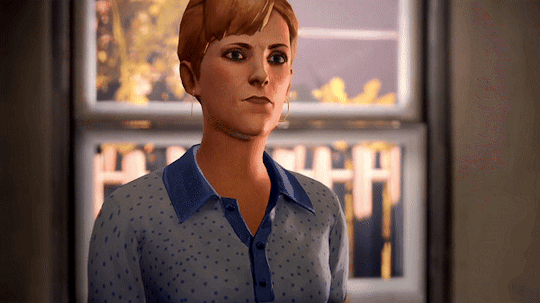
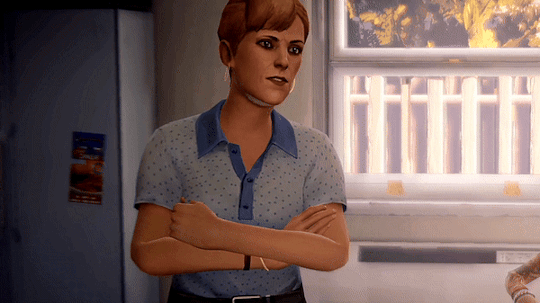
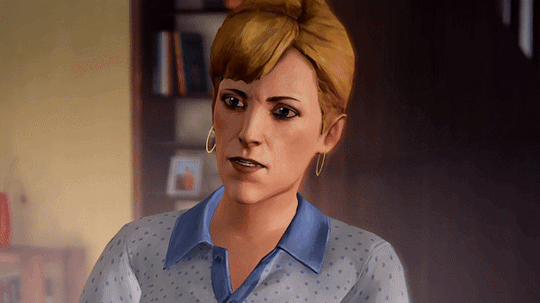
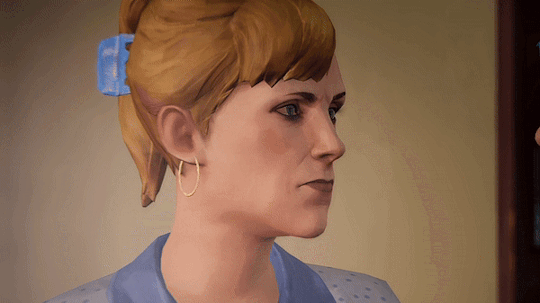
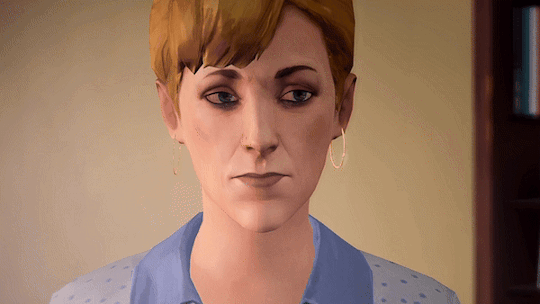


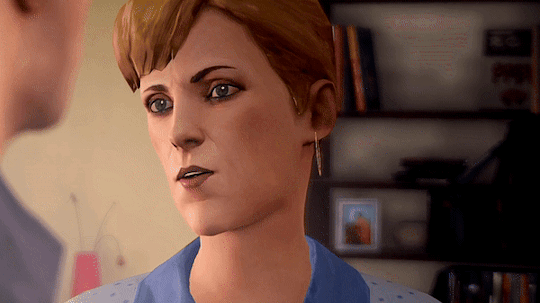
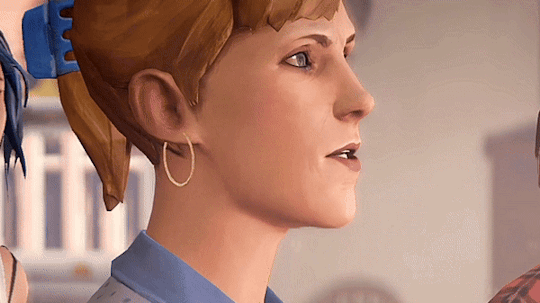
Joyce Price in Life Is Strange (2015)
#Crimson's Gifs: Life Is Strange#Life Is Strange#LIS#LIS1#LIS 1#Life Is Strange 1#Life Is Strange (2015)#Joyce Price#Chloe Price's Mom#Poor Joyce but I truly believe siding with Chloe over David is the best option here#Simply because David needs to be confronted with the way hes operating and acting being wrong#Its for his own good and character development for this to happen unfortunately for Joyce#Im sure if arcadia bay didnt get nuked they would've worked it out either way anyways
15 notes
·
View notes
Text
Okay in terms of conjoined twins you have homotaleral control and sensory. Aka they dont control eachothers parts and bc john is all over the place (we tried to map it with the aforementioned friend who regularly diagnoses Arthur each episode at this point)
Again with chimerism its less about control of regions and more about genetic differences in certain regions.
As for the separating the brains bit... you are referring to crabiopagus twins as far as I understand? In that event a successful case requires the pair of twins to be well developed for the surgical removal to be successful. Its a risky operation and also a rare condition and again in that one the motor and sensory control of each twin is their own.
Long story short non of these conditions are applicable mostly because they involve either a pair of conjoined bodies or several genomes. Which is not really the case for our dear Arthur and John.
How ever don't get me wrong I am just clarifying the scientific basis for a semi scientific theory. After all we are still talking about an eldritch entity in a guys head that can do willy nilly. The sky is the limit and I have absolutely zero authority on what you theorized or headcannoned. Im literally a nobody on the webss
Okay i am studying cortical regions and i came to primary visual area (brodmann 17) V1 and im reading about cortical blindness and it made me go ahh arthur lester.
So hear me out, head cannon time. What if John does not have his hand hand: he has his right motor cortex for his hand left motor cortex for his leg (also somatosensory) and his primary visual are. He has parts of Arthurs brain.
So something funny about cortical blindness is that the pathway between the retina and the amygdala and limbic system are intact. So if you tried to punch Arthur he can dodge as long as his amygdala perceives it as danger. This explains to me all the “here”s and “arthur be careful” or “arthur run”s the man cant see but he can sense the danger.
The only thing that is not in line with this hc is that he knows he cant see, which is something cortical blindness patients usually dont acknowledge. Like they will make up what they see based on other stimuli. But if you knew Arthur was blind and asked him what he sees and he responds with what John says bc he thinks you dont know he is blind then yeah I would diagnose cortical blindness not peripheral…
I should send this to my friend who tried to diagnose him in season 5. Was so sure it was tuberculosis (same). Being med students and listening malevolent is an experience.
44 notes
·
View notes
Text
Feel like I haven’t been posting very much lately and definitely not much (enough) about Teddy and it’s because I have like two thoughts on my mind:
1.) Sandra had to die.
2.) What if she didn’t, though?
#there was no other way it could’ve gone something about lisa bowerman saying sandra couldn’t develop#but operational duty manager sandra mute owns my heart
2 notes
·
View notes
Text
just went through all my ao3 fics and edited all the tags because i feel like i overtag a lot and it always bothered me. tbf the most overtagging happens in my relationship/character tags but i find it super difficult to judge who/which relationship is important. like friendships are So Important in my fics i dont feel like i cant tag less there? especially my longer fics. amtc james&sirius and black brothers are in my mind at least if not more important than literally amtc jegulus. i know its a jegulus fic but also jegulus is just the catalyst for other relationship dynamics. how do you tag that stuff
#honestly same with operation wanker#i finally put the wolfstar tag at the end of the relationship list#because genuinely when i first wrote the fic i debated leaving that out completely because i just do not focus on them At All#but considering theyre the very reason for the whole fic i couldnt not tag them#but james and sirius in operation wanker are as important to me as jegulus#and they go through a similar plot line of developing and changing so ?? yk???#idk how to tag i am really bad at it honestly#as you can tell i have exam season#hence me doing anything but the things i should be doing#hp#fic rant#i need a tag for general ramblings#i did take out a lot of character tags in a lot of my fics#like in some of them i literally now have a relationship tag but not the character tag which im also still not sure at#like on lies and spies still has the peter&marlene tag but it doesnt have a marlene tag anymore#and im still debating if i should also take the relationship tag out but also its important for peters actions??? idkkk man i am bad at thi#took out a lot of tags from amtc because i just felt it was too long overall#like i do think they were not completely unimportant but it was such a wall of text i felt a bit overwhelmed#tagging fics where its literally just 2 characters and theyre romantically/sexually involved is so much easier#like on high delight the tags make perfect sense because its very obvious what the focus is on#but i so seldomly write fics that are confined to just a ship (/) dynamic#maybe this is my arospec that ive been eyeing for the past 10 years and keep ignoring showing#i just care about writing relationships (&) so much more honestly#ok thats actually a lie im not tooo good with just platonic fics but i like writing romantic stuff in the context of friendgroups#i like characters having to keep secrets from the people they usually tell evrything to#love exploring characters finding out they have friendship boundaries they previously didnt know about#love writing about trust and and conflicting feelings and having to make choices#also lmao very iconic of me to have 5km of tags on a post of me saying i am prone to overtagging. really proving my own point here
7 notes
·
View notes
Text
my male snail (aquatic) needs to clean up my female snail already. they usually crawl over each other's shells periodically but my boys been SLACKING and she's growing quite the algae coat
#ik snail genders aren't that distinct but it does seem to be how these two are operating#they've made many eggs and she uh. well. hilariously she lays the eggs ON him#so I'm like well okay u two can breed and a snail couldn't lay eggs on the back of their own shell#they're nerites tho so the eggs never hatch bc they need saltwater to develop then freshwater to live
4 notes
·
View notes
Text

I don't think Robotnik ever saw Stone's affection as genuine. He's used to people only valuing him if he's useful. His own bosses call him a freak, yet they put up with him because of his "perfect operation record". He isn't even shocked when he learns the goverment erased him, he expected it and had a contingency plan ready.

He keeps calling Stone a sycophant and a barnacle, because why else would someone stay with him if not to gain something? Clearly, Stone is just a suck-up wanting to ride his coattails. And Ivo is fine with that! He gets his ego stroked and in return Stone gets a slice of the world-domination pie. Mutually beneficial!

This symbiotic relationship gives Ivo a sense of control and ensures that Stone won't abandon him like everyone else. It also keeps him detached: of course Stone waited months or him to return from space, that's his job. His admiration is inevitable, and meaningless.
Ivo develops a genuine, irrational attachment to Stone, one he's able to rationalize as just being transactional. Those emotional walls shield him from the fear of abandonment that comes with caring for another person.

Except...even after Robotnik becomes a liability, Stone stays. There's no benefit, no plans of ruling humanity, not even a paycheck. Yet despite everything, Ivo tries to keep the old boss/employee dynamic going. He can't fathom the idea that someone would stay for anything other than convenience.

Then Gerald shows up, and for the first time Ivo allows himself to put down those walls. As an orphan he had built up this idealized image of family that he thought he could never have. People will use you then toss you aside when convenient, but family? Family is different. Family will always be there for you and love you no matter what. Family won't abandon you.
And suddently Stone's grovelling is no longer necessary. Why would he need someone who just pretends to like him when he now has all the unconditional love he's always longed for? That's obviously why Stone got so jealous, it couldn't have been real concern, he was just afraid of losing his comfy position as the lapdog of humanity's new king. Between a sycophant and family, the choice felt obvious.
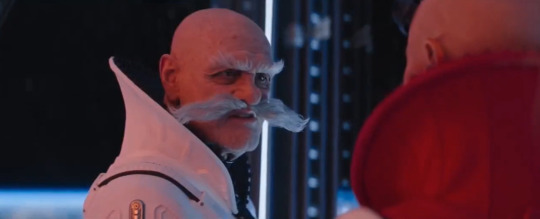
And, of course, Gerald turns out to be just like everyone else in Ivo's life: just another person trying to get something from him. The second he stopped being useful, he was tossed aside.
His image of family is once again shattered, but those emotional walls are already down. Now that Ivo experienced that betrayal he was so afraid of, now that he's about to die, he's finally able to be honest with himself.

Looking down on Earth, he realizes there had only ever been one person on that blue marble who actually cared. Someone who had always been there, even when there was nothing to gain. Stone had never abandoned him.
But he had abandoned Stone. He tossed him aside, just like Gerald did to him. Now that he's able to understand how Stone felt, this is his last chance to make things right.

In his final moments, with nothing to fear, Robotnik puts down his emotional walls and opens up as best as he can. Stone had done so much for him, asked for nothing in return, and now it was his turn to do the same. Ivo helped save the world, not for recognition or convenience, but simply out of love.
Stone had always been a sycophant to him, yes, but he had also been a friend. A sycofriend.
#sonic movie#sonic movie 3#sonic the hedgehog#sonic movie 3 spoilers#dr. robotnik#eggman#agent stone#stobotnik#< it can be read as romantic or platonic it's more alligned with canon#sth#sonic movie analysis
8K notes
·
View notes
Text
Checklist for Transitioning Founder-Owned Law Firms
When transitioning from a founder-owned law firm, it’s essential to establish a clear plan to ensure the firm’s continued growth and stability. A successful transition depends on strategic priorities that enhance operational efficiency, improve client satisfaction, and secure long-term success. Below, we outline the key areas to analyze and implement for a seamless shift in leadership and…
#Attorney Development#Compensation#Equity Transfer#founder-owned law firm#Incentives#Marketing Effectiveness#operating agreements#partnership#Policy Development#Recruiting Effectiveness#Supportive Platforms#Technology#Work-Life Timelines
1 note
·
View note